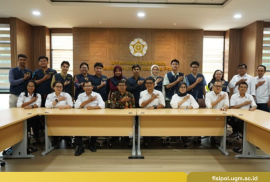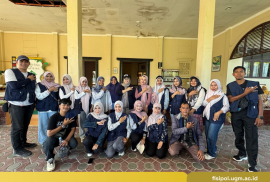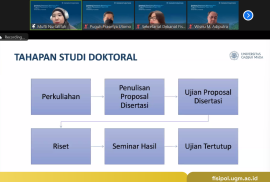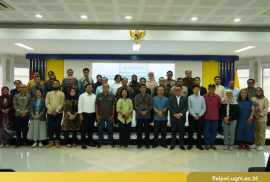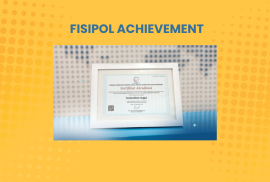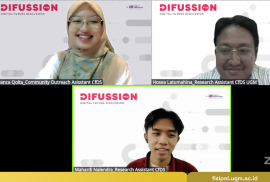Yogyakarta, January 5, 2026─The Faculty of Social and Political Sciences, Gadjah Mada University (Fisipol UGM), held a briefing and farewell event for the Fisipol Mengajar (Education Rehabilitation Volunteer Program) in Aceh on Monday (5/1). The Fisipol Mengajar program is an initiative of Fisipol UGM to contribute to post-disaster education recovery and rehabilitation efforts in Aceh. The program is fully supported by the university and is implemented in collaboration with the Sukma Foundation as a strategic partner. Twelve Fisipol UGM student volunteers will be deployed and placed in two different regions: Bireuen and Pidie Jaya. The twelve students will volunteer for 30 days, from January 10 to February 8, 2026.
SDGs 4: Quality Education
Aceh, January 10, 2025─The Faculty of Social and Political Sciences (FISIPOL) of Gadjah Mada University (FISIPOL UGM) deployed student volunteers through the FISIPOL Mengajar: Education Rehabilitation Volunteer Program at three locations in Aceh on Saturday (10/1). The three assigned locations include Km 60, Ateu Lintang, and Bintang, Takengon.
The FISIPOL Mengajar Program is an initiative of FISIPOL UGM as a contribution to supporting post-disaster recovery and rehabilitation efforts in the education sector in Aceh. This program is fully supported by Gadjah Mada University and implemented in collaboration with the Sukma Foundation as a strategic partner in implementing field activities.
Yogyakarta, January 8, 2026—To support the dissemination of information about the Postgraduate Program as the registration period progresses, the Faculty of Social and Political Sciences (FISIPOL) of Gadjah Mada University (UGM) held a Socialization of New Student Admissions for the Postgraduate Program Wave 4 for the Even Semester of the 2025/2026 Academic Year today, Thursday (January 8). This online event was attended by approximately 70 prospective students from various regional, academic, and professional backgrounds.
Yogyakarta, January 7, 2026─The Faculty of Social and Political Sciences (FISIPOL) of Gadjah Mada University (UGM) held a farewell and welcome gathering for new department and study program management today, Wednesday (January 7), at the 4th-floor Auditorium of FISIPOL UGM. This event followed the inauguration of the department and study program management at Grha Sabha Pramana this morning and served as an important momentum for strengthening department and study program management within the FISIPOL UGM academic environment.
Yogyakarta, November 3, 2025—The Department of International Relations, Faculty of Social and Political Sciences, Universitas Gadjah Mada (UGM), has successfully achieved UNGGUL accreditation for its Undergraduate Study Program. This accreditation is carried out by the Independent Accreditation Institute for Social, Political, Administrative, and Communication Sciences (LAMSPAK), which has designed assessment instruments and criteria that refer to several quality references as criteria for assessing study program accreditation eligibility.
Yogyakarta, October 27, 2025—The Academic Innovation unit of Fisipol UGM has initiated a new course titled “Forest Carbon Literacy 2025” on the FOCUS platform. The launching ceremony for the new course invited three speakers, as well as a module writer from the Forest Carbon Literacy 2025 course, that is Wahyu Yun Santoso (Lecturer at Fakultas of Law UGM), Budi Mulyana (Lecturer at Faculty of Forestry UGM), and Sarah Wibisono (Sustainability Consultant).
This year, the course is created with the intent to focus on the management of forest on the international level, emphasizing through cross-border comparison in understanding the best practices, as well as failures management of forests in other areas. In the making of this course, Fisipol UGM, through the Academic Innovation Unit, collaborated with UGM’s Faculty of Forestry, Faculty of Law, Chakra Giri Energi Indonesia, and Oxfam.
Yogyakarta, October 21, 2025—In an effort to support the development of student competency, the Faculty of Social and Political Science of Universitas Gadjah Mada implemented a new policy for every student who will graduate. As of July 2024, every graduate from the faculty is required to have an English Proficiency Test certificate equal to TOEFL ITP/IBT, ACEPT, as well as IELTS with at least a minimum score. For those who do not achieve the minimum score, there are two program schemes that can help graduates achieve the minimum score. This announcement was made in a socialization session by Fisipol’s Academic Innovation Unit on Monday (20/10).
Yogyakarta, October 15th 2025─Artificial Intelligence (AI) is now a hot topic that is not only discussed in academic circles, but also in industry and public policy. Through DIFUSSION (Digital Future Discussion) #128 entitled “Indonesia’s AI Trajectory: From Hype to Investment Challenges,” the Center for Digital Society (CfDS) UGM traces the journey of AI in Indonesia, from technological euphoria to the real challenges in building a sustainable ecosystem that is in line with national interests.
Yogyakarta, 2 October 2025–The Faculty of Social and Political Sciences, Universitas Gadjah Mada (FISIPOL UGM) held a workshop entitled “Contesting Hegemony: Labor, Ideology, and the Limits of Resistance in Post-Authoritarian Indonesia” in the FISIPOL UGM’s 4th floor auditorium. The event featured four speakers: Vedi Hadiz (University of Melbourne), Hari Nugroho (Universitas Indonesia), Diatyaka Yasih (Universitas Indonesia), and Muhtar Habibi (Universitas Gadjah Mada). The discussion explored how power, ideology, and the working class interact in Indonesia’s post-New Order political and economic system, as well as the extent to which community survival strategies can develop into forms of resistance against hegemonic domination.
As the Director at Directorat of Partnership, Alumni and Global Initiatives of Universitas Gadjah Mada, Prof. Dr. Puji Astuti, S.Si., M.Sc., Apt. welcomed the Chinese Ambassador to Indonesia, leaders from Xiamen University, as well as faculty staff from Fisipol UGM. She mentioned that the achievements in years of bilateral cooperation has strengthened Indonesia’s relationship with China in the aspect of trade, culture, and national development. “Today, we will continue to strengthen our commitment to strategic cooperation, especially in the field of infrastructure, information, and technology. We will open communication mainly to balance it with our national interests,” She added.
In line with that spirit, the Chinese Ambassador to Indonesia, Mr Wang Lutong, felt honored to be a part of Indonesia’s friendship with China. According to him, the world is in the middle of facing new challenges that can possibly change the future. Global South countries must then cooperate and coordinate in order to face this issue, while also maintaining security as well as just global policies. “China and Indonesia are two big nations, and our 75 years of bilateral diplomatic relations has become a model for other countries to follow,” He said.

